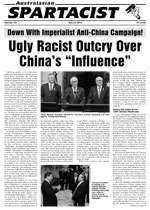
LGBTI and Identity Politics Letter 20 March 2018 Dear comrades, I was happy to see a leaflet on the question of same-sex marriage in Australasian Spartacist No. 232 (Spring 2017). But, while putting forward a broader program for the working class to take up the fight against anti-gay and anti-trans bigotry, the leaflet falls into the trap of liberal identity politics. The most obvious mark of this was the overuse of the acronym “LGBTI,” buying into the false narrative of common struggle of all the marginalized people it covers. This trendy term has a lot of political implications and should be used sparingly by Marxists who have a much more precise understanding of the complexities of human sexuality. The increasingly bloated acronym—which often includes “I” for intersex, “Q” for questioning or queer, “A” for asexual or ally, among others—is used by liberals as a type of unifying term. The only argument to use it, besides its linguistic convenience, is that it has gained currency in recent decades. But the notion behind “LGBTQI+” is that you can simply add anyone else who is ostracized to the acronym, and voilà!...suddenly you’re progressive. Many added intersex as a way of “increasing awareness,” which is not a program for actual liberation. If the acronym becomes a standard in a Marxist press, it’s an adaptation to the petty-bourgeois lifestylist milieu pushing narrow inclusivity which, in fact, will always mean excluding someone else! What about adding “P” to the list, for Pedophile, Pederast, Polygamist or Polyamorist, all of whom also face some type of prejudice or bigotry? Such an addition would be frowned upon by many in the professed gay “community”—another phrase that should be avoided since it implies a uniform culture. The term “Queer,” which is used in shorthand for anyone who is not hetero and cis-gender, still hasn’t lost its pejorative baggage and suffers from some of the same political pitfalls. We do not assume all ostracized individuals—whether gay, lesbian, trans, non-binary, or intersex—face common oppression, and nor do they share common interests. There are palpable class and race divides within these groups, as well as divisions between these groups. The mainstream gay “movement” has long been hostile to trans people, in large part because gender non-conforming people were a blemish on its aspirations for bourgeois respectability. Exposing such antagonisms, like the hostility by radical exclusionist feminists against trans women who aren’t considered “real women,” helps reveal the utter bankruptcy of identity politics. Unwittingly, the leaflet confuses sexual orientation and gender identity by placing them under this popular terminological umbrella. But who one is erotically attracted to (or even who one chooses to get married to) is different from how one identifies, which can be independent of the sex assigned at birth. This can also change for people within the course of their life. As Alice Dreger points out in her book Galileo’s Middle Finger: “To oversimplify it a bit, we could say that intersex is primarily about how you are born in terms of your sex organs, and transgender is primarily about how you feel in terms of your gender identity.” Many trans people express that they were born with the brain of one sex and the body of another. Intersex people have a mix of male and female traits, chromosomes and/or organs, but society, parents, doctors tell them they must live as one sex or the other. The oppression that trans and intersex people suffer is complex, and is often distinct from the oppression that gay and lesbian people face for their sexual identity. Meanwhile, bisexual people (the “B” in LGBTI) are discriminated against when they are treated as gay or lesbian, not because they are bisexual, per se. Trans and gender non-conforming people who challenge reactionary sexual stereotypes are ostracized in practically all walks of life and face vicious violence and harassment. Intersex people are cruelly exploited by medical professionals, subject to mutilation, surgery and “supervision” as babies or children, and later are subjected to sexist “gender testing” when in certain segregated professions like sports. Breaking rigid sexual and gender norms under capitalism can subject someone to psychological torture, physical abuse and discrimination, carrying consequences from housing and employment to medical treatment. The right to marry is a fairly straightforward democratic right, its social importance being that marriage confers other rights like health care, citizenship, etc. But for many people under that “LGBTI” masthead, marriage is the least of their concerns, especially in more sexually repressive cultures and societies, where not conforming can equal a death sentence. Fundamentally, people’s sex lives as well as gender identities ought to be their own business and is not the business of the state. The only guideline that should exist between sexual partners is that of effective mutual consent. Sexual diversity is boundless, but it is stymied and stifled under bourgeois norms and the capitalist power structure—which must be overturned! We shouldn’t simplify it further by adapting to societal pressures in our revolutionary press. Comradely, Laura
|
|
||||||||||||||||||||||||||||||||||||||||||
